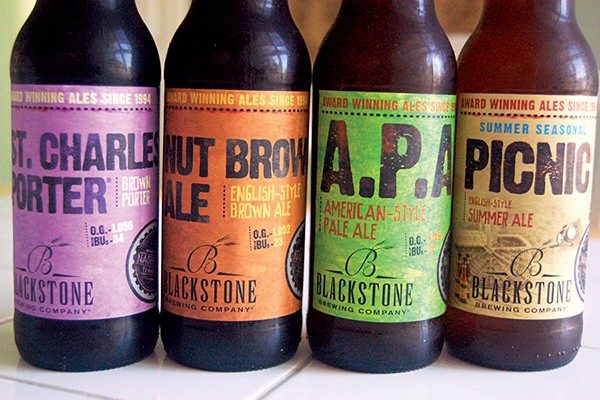Kent Taylor, co-owner of Nashville’s Blackstone Brewery, pointed to the glass in front of us: “We are all about what is in there,” he said. What I was looking at was an inviting pint of Blackstone Brewery’s St. Charles Porter — the most award-winning Brown Porter at the Great American Beer Festival, racking up eight medals. It is also a polished version of the homebrew Taylor used to whip up in his kitchen.
I’d dropped into the Flying Saucer in Cordova to pester Kent and the Blackstone crew about beer, markets — and to ask him, “Where exactly have you been for the last few years?”
Actually, Blackstone has been out of west Tennessee for about three years. It wasn’t a lack of demand for Blackstone’s beers, such as the St. Charles Porter or their Hopjack IPA — a dry hopped and hazy ale — it was more a matter of maintaining that tricky and elusive equilibrium of quality versus capacity. Whether or not a beer is craft shouldn’t depend on some minority ownership, but how the brewer deals with expanded markets. Getting philosophical about it, Taylor asks: “The question is, when you open up a new market, can you serve that market and continue to serve the original [market]?”

In a hyper-competitive market, very rarely do craft breweries fail or fly on the quality of their beer alone. Breweries, craft or not, are businesses, and businesses require focus on the product and the market and all the other things customers never see. The real trick, in any business, is to refocus when things change. And they always do.
It is fitting that Blackstone was relaunched into Memphis on Repeal Day, December 5th. In Tennessee craft beer circles, Blackstone is about as historical as you get. One of the first craft breweries in Nashville, the Blackstone Restaurant on West End Avenue predates the craft beer boom altogether. When the place first opened, customers walked out when they learned that they couldn’t get a Bud Light. Things have changed, and Nashville now has more than 20 craft breweries and counting. And no one seems to get their nose out of joint if they can’t find a Busch or a Milwaukee’s Best at a brew pub.
Blackstone had been churning out its award-winning beer at a rate of 1,200 barrels a year. The restaurant was a Nashville fixture. Then things changed — again. Co-founder Stephanie Weans lost her battle with cancer a few years ago. Taylor, a CPA by trade, was more comfortable behind the curtain. Stephanie had the personality; she was good at being out front. “Everything I know about running a restaurant I learned from her,” Taylor says. “And one thing I learned was that I wasn’t a restaurateur.”
In light of the painful loss of a productive partnership, as well as capacity constraints and a changing marketplace, it was time to refocus on what was in that glass in front of us: the beer. The Brewery contracted to refocus on what it was brewing, opening a new 15,000-square-foot facility with a 60,000-barrel capacity and a taproom. After shutting down the restaurant for a remodel, the decision was made to close its doors for good after 23 years.
The new capacity has changed things yet again. Now available in bars such as the Flying Saucer and Young Avenue Deli, as well as in local grocery stores, Blackstone is back, serving the entire state with an eye to opening up markets in Kentucky and north Alabama. Yet through the changes, their beer has remained remarkably consistent.
The Hopjack IPA is a great go-to ale. The wonderfully designed Dark Matter Black IPA is a clever twist on the style — still full of hops but with the darkness of roasted malt. You can get their award-winning Nut Brown all over town, along with that St. Charles Porter — dark, but not too heavy, with traces of mocha and cocoa.
And that is how you make a change and still fill the glass with a beer you’re known for.